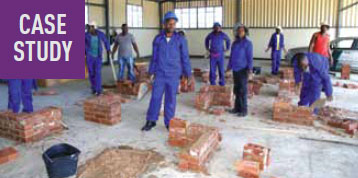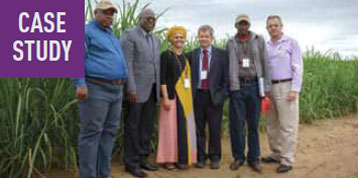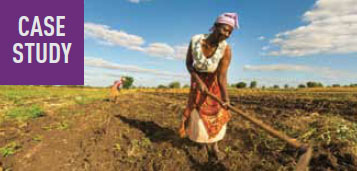stakeholder relationships
Social & Relationship Capital |
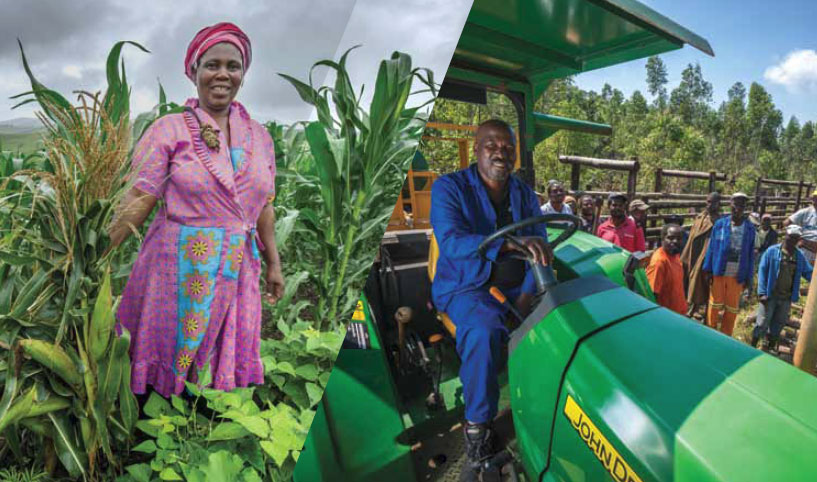
| Nature of engagement | Priorities for stakeholders | Outcomes | |
| Shareholders,
investors and analysts |
|
|
|
| Government authorities and regulators |
|
|
|
| Private farmers |
|
|
|
| Local communities |
|
|
|
| Employees |
|
|
|
| Customers, suppliers and service providers |
|
|
|
SOCIO-ECONOMIC DEVELOPMENT (SED)
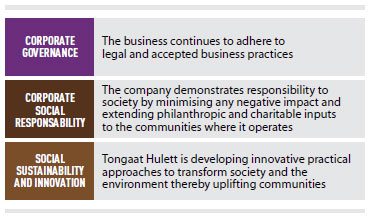
Tongaat Hulett’s objective of creating value for all stakeholders through an all-inclusive approach to growth and development underpins the various SED initiatives. This is driven from the business’s core values which include integrity and a commitment to ethical behaviour. Tongaat Hulett has articulated the principles which it embraces in its approach to SED in the graphic on the right:
The company exceeded its commitment of allocating one percent of annual headline earnings to SED for the 12 months to 31 March 2016 by investing R190,5 million
(2014/15: R140,7 million), including the cost of company-sponsored occupational and primary healthcare services. Operations in Zimbabwe, Mozambique and Swaziland accounted for 84 percent of the total amount invested in SED initiatives. Key elements of SED spend for the year are as follows:
Healthcare
- With the majority of operations being located in rural areas, a significant amount is invested in running healthcare facilities for employees and local communities.
- R87,6 million was invested in health-related activities during the period, including activities related to dealing with the impact of HIV/AIDS.
Basic needs
- R8,9 million was invested in basic needs and social development, which includes food security projects and the provision of basic materials to uplift communities around company operations.
Sports, arts and culture
- The company acknowledges the important role that arts, sports and culture can play in the development of successful rural communities.
- R17,5 million was invested in these initiatives during the year.
Education
- R18,9 million was invested in education initiatives across the company.
- This included the purchase of exercise and textbooks and new chairs in the estate schools in Mozambique, Swaziland and Zimbabwe.
FOOD SECURITY

The need to produce food with minimal environmental impact has never been more challenging given the current impacts of dietary patterns, declining soil quality, water scarcity, energy price fluctuations and the unpredictability of climate change. Tongaat Hulett understands the crucial role that agriculture can play in improving food security, and ensuring environmental safety. As a member of the United Nations Global Compact, Tongaat Hulett is committed to accelerating its disaster risk reduction activities and to make food production systems more resilient and capable of absorbing the impact of disruptive events.
PROMOTING SUSTAINABLE
AGRICULTURE
Tongaat Hulett assists small-scale farmers to become professional growers as this improves living conditions for rural communities, while improving food security in a sustainable manner. Inclusive agricultural growth is promoted: small-scale farmers produce part of their own food requirements and surplus production is available for local and regional markets.
The company applies a range of conservation methods and compliments agricultural extension projects with a portfolio of partnerships in advanced crop science and land-use strategies to ensure that every field is environmentally assessed before planting. In selected areas, depending on soil conditions and other agronomic influences, a range of cover crops are used to improve soil conditions and nitrogen prevalence for the subsequent sugarcane crop. This is implemented with the view that better farming practices will halt and in some instances reverse the negative process of soil degradation. At the same time, farmers are encouraged to use existing farmland more efficiently. Sustainable farming solutions include not tilling the land, crop rotations, bringing vegetation back to degraded land and planting vegetation around fields to prevent erosion.
SUPPLY CHAIN

Greater awareness of stakeholder needs highlights supply chain opportunities. Tongaat Hulett is committed to innovative procurement initiatives that deliver value to the business, stakeholders across the value chain and the communities in which it operates.
To optimise the benefits, cross functional teams involving strategic sourcing, human resources, SHE and various business operations, continue to work together on identifying initiatives that have the potential to deliver positive economic, social and environmental outcomes, including:
- Strategic Sourcing Centre of Excellence - establishing a strategic sourcing function and institutionalising new and best practice approaches to the company’s procurement function. The team is building long-term sustainable procurement and strategic sourcing capabilities and skills, while enhancing policies, processes and systems.
- Local procurement and enterprise development projects - an enterprise and supplier development strategy has been developed, aligned to the strategic sourcing end-state strategy - both of which are being rolled out and operationalised across the business. A concerted effort is applied in collaboration with the rest of the business to uphold the current favourable B-BBEE status of Tongaat Hulett, from a South African context, and to improve BEE compliance and align it to the Revised Agri-BEE, Property and relevant “still-to-be gazetted” sector codes.
- Green procurement initiatives - suppliers of the company demonstrate commitment to research, development and delivery of safer, resource efficient and environmentally-friendly goods and services as a good business imperative. Special focus is being paid to import replacement and local and intra-Africa trade programmes as opposed to off-shoring sourcing options, to reduce the carbon footprint and support local production and economic development.
Preferential Procurement
Tongaat Hulett is committed to supporting suppliers, improving their empowerment credentials and introducing black-owned and black women-owned SMEs as suppliers to the business. The objective of preferential procurement under the Department of Trade and Industry’s current B-BBEE Codes of Good Practice (in South Africa) includes the promotion of B-BBEE compliance by all supplying entities and provides targets for procurement from Exempted Micro Enterprises (EMEs), Qualifying Small Enterprises (QSEs), black-owned EMEs and black women-owned EMEs. Furthermore, with enhanced recognition given for preferential procurement from value-adding suppliers and enterprise development beneficiaries, the procurement of locally-produced goods and services is actively supported, to assist in developing sustainable income streams for such new entities and create jobs. Major inroads have been made in transforming the supplier base with solid improvement plans to close current gaps in the preferential procurement space.
For the period ending 31 March 2015, adjusting for the various levels of recognition of BEE spend allowed for in the BEE Scorecard (dependant on the BEE level of suppliers), the total recognised BEE spend was R7,131 billion which is 103,83 percent of the eligible spend. R473,8 million (6,9 percent) was in relation to QSE B-BBEE spend, R161,7 million (2,4 percent) in relation to EME B-BBEE spend, R121,3 million (1,8 percent) was in relation to black-owned EME suppliers and R28,4 million (0,4 percent) was in relation to black-women owned EME suppliers.
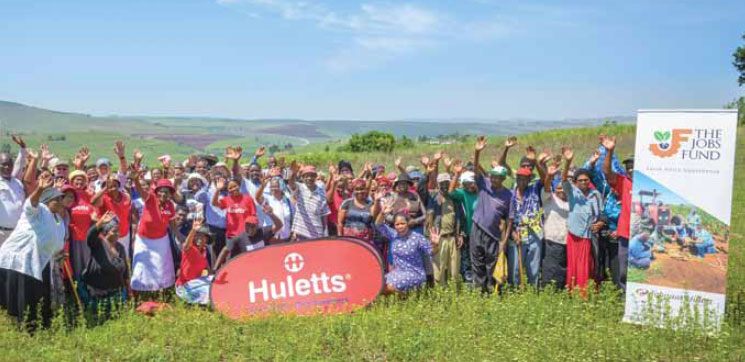

SAFETY, HEALTH AND
ENVIRONMENT (SHE)
A recently revised Safety, Health and Environmental Policy statement, signed by the CEO in August 2015, re-assured stakeholders that Tongaat Hulett subscribes to the principle of ‘zero harm’. The ‘zero harm’ philosophy is embedded in the company’s business framework as a core value. Momentum gained over the past 10 years in developing current SHE practices is being raised and directed at creating an interdependent SHE culture that relies on everyone’s responsibility and participation. An all-inclusive stakeholder engagement approach is therefore being adhered to, in encouraging employees, contractors, private farmers and members of surrounding communities to actively care and participate in SHE campaign programmes.
Stakeholders are always encouraged to take ownership of their own safety and health as individuals and to do the same for other people interfacing with them in the workplace, community and social environments. It is agreed between stakeholders that protecting the environment and its resources is a collective responsibility for everyone. All stakeholders are therefore involved with relevant SHE thrusts outlined below.
Safety
Regrettably, a total of five work related fatalities were suffered during the year 2015/16. The fatalities experienced are deeply concerning and are thus receiving a high level of attention within the company.
Nevertheless, Tongaat Hulett’s safety performance has improved during the past decade having been built up on established safety management systems and various safety improvement initiatives. It is acknowledged that focusing purely on systems, without the support of dedicated high level safety interventions, would have only driven safety improvement to a certain extent. The company has been consciously introducing targeted fatality risk control initiatives that were reviewed periodically. This approach has contributed to a sustained safety improvement realised so far.
Notwithstanding the fatality challenges experienced, the company’s safety performance continues to improve in terms of serious injuries that result in loss of time. A Lost Time Injury Frequency Rate (LTIFR) of 0,073 per 200 000 hours worked, was achieved in 2015/16 reflecting a milestone achievement since SHE management systems were established more than a decade ago. This LTIFR achievement suggests a consistent performance reflecting on a LTIFR of 0,085 achieved in 2014/15, 0,087 achieved in 2013/14 and 0,094 in 2012/13.
The following key factors are attributed to the LTIFR improvement:
- A structured risk management programme providing for business baseline, activity based and continuous risk assessment processes determines how safely work should be done.
- Audit management protocols enable occupational risks/shortcomings to be identified and addressed proactively while incident review processes reveal learning points from incidents that can be shared to prevent re-occurrences.
- A SHE culture of caring is campaigned for and practiced to support individuals and employee teams.
Food safety
Tongaat Hulett has a reputation of being a producer of high-quality products. To ensure that this reputation is maintained and the company continues to meet the needs of customers in the food industry, Tongaat Hulett manages its maize requirements on a non-genetically modified basis using a sophisticated identity preservation system. In addition, on-going attention is paid to the requirements of FSSC 22000 (a Food Safety System Certification used by food manufacturers which is aligned with ISO 22000 and includes Good Manufacturing Practices), ISO 22000 and ISO 9001, in terms of quality and food safety standards at all operations.
With regard to the proposed tax on sweetened beverages, the South African sugar industry, which includes Tongaat Hulett, continues to engage closely with government to understand it's thinking and intentions.
Sugar or sucrose is a natural plant product. It is produced by the sugarcane plant in much the same way that other plants, such as fruit and vegetables, produce sugars. Neither white nor brown sugar contains additives or preservatives of any kind, although the excessive consumption of any foodstuff, no matter how harmless, is not conducive to good health. Sugar is a natural and healthy contributor to the enjoyment of food as part of a sensible and balanced diet.

Health
Tongaat Hulett has 40 858 employees (peak milling season) working at 27 locations in six countries in Southern Africa. Health issues across the region where Tongaat Hulett operates are therefore varied. The company is dealing with a challenge to tackle common health issues in a coordinated manner to optimise health and enhance productivity in employees’ lives and workplaces. While aligned health procedures are in place at all operations, country specific geopolitical issues are expected to influence the readiness and ability of Tongaat Hulett to partner with relevant stakeholders and implement associated programs in the various operating countries.
HIV and AIDS
HIV/AIDS remains the single biggest health challenge as shown by Tongaat Hulett’s 2015/16 statistics detailed below:
- Employees currently receiving anti-retroviral treatment (ART) through company-provided ART: 3 768
- Voluntary counselling and testing (VCT) uptake: 88,4 percent
- Employees knowing their status: 90,5 percent
- Number of new employees confirmed HIV+ on testing: 1 187
- Number of employees currently HIV+: 4 689
- HIV prevalence: 21,6 percent
- Cost of ART: R1,9 million
- Seasonal employees/contractors VCT uptake: 9 951
- Seasonal employees/contractors on ART: 1 080
Tongaat Hulett acknowledges that more than a fifth of its workforce is HIV positive and the company has already invested significantly in the treatment of those affected by HIV. The increasing number of new infections in 2015/16 (5 percent of workforce) is a lagging indicator in the fight against HIV. The apparent high number of new infections is in part due to HIV+ employees presenting for re-testing mainly in Mozambique and to a lesser extent in Zimbabwe as testing is being done anonymously. The company is determined to improve its HIV/AIDS management programmes and close the gap between current performance and the 90:90:90 stretch target set by the World Health Organisation (namely 90 percent of workforce should be tested; 90 percent of HIV+ people should enrol for ART; 90 percent of those on ART should remain on ART). In response to these objectives, Tongaat Hulett will:
- Enhance preventive efforts
- Intensify awareness campaigns
- Promote male medical circumcision at all operations
- Stretch VCT (HIV councelling and testing) targets for 2016/17
- Scale up ART
- Increase investment to achieve 90 percent on treatment
- Strengthen treatment, monitoring and follow up
The company’s existing relationships with governments and NGO’s are critical to the success of the objectives detailed above.
PRIMARY HEALTHCARE
Primary healthcare includes the provision of maternal child health care, control of communicable diseases e.g. cholera, tuberculosis and measles and treatment of acute ailments such as colds. Tongaat Hulett continues with current efforts to provide cost effective primary health facilities and programmes for its employees. In areas where government-supported health facilities are not readily accessible, this service is being extended to employees’ families. This is mainly in Zimbabwe, Mozambique and Swaziland. Private Public Partnerships are being pursued to optimise on resources available while at the same time increasing effectiveness in dealing with essential community engagement issues.
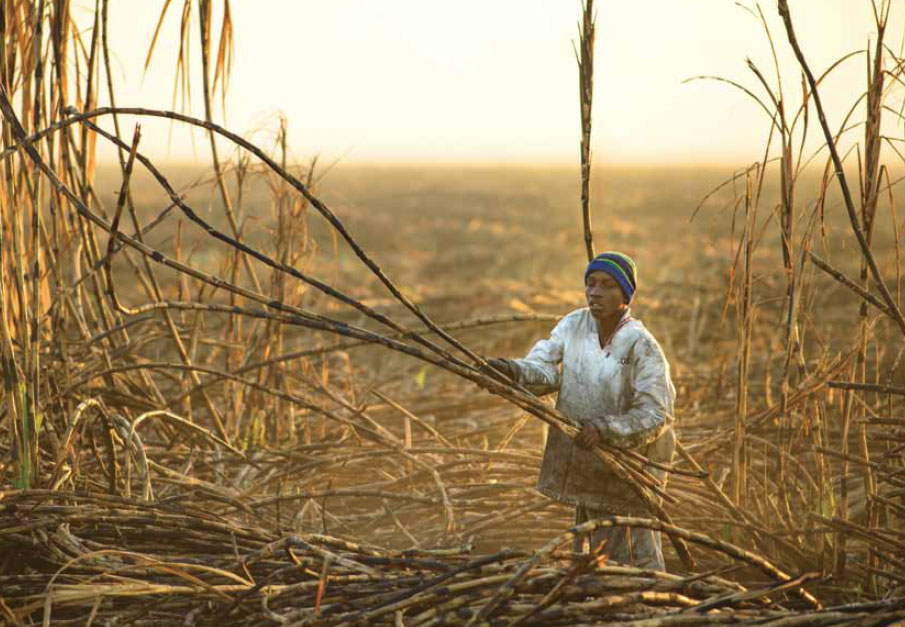
MALARIA
Malaria remains a health challenge in Zimbabwe, Swaziland and Mozambique. Integrated malaria control programmes that include vector control, awareness, personal protection, diagnosis and treatment will continue. Bioassays (resistance testing) are being conducted to ensure effectiveness of current indoor residual spraying initiatives. There were no malaria-related fatalities recorded at Tongaat Hulett’s operations during 2015/16. There was a nine percent decrease in the number of malaria cases recorded in 2015/16 compared to the previous year.
OCCUPATIONAL HEALTHCARE

Noise Induced Hearing Loss (NIHL) emerged as an issue of concern at all operations. Varying degrees of percentage hearing loss are being detected during medical surveillance programmes.
The three main contributory factors have been identified as:
- The old design and age of equipment in use at most operations
- An aging workforce who are more susceptible to effects of noise
- Improper use of Hearing Protective Devices (HPD) by employees
While engineering solutions continue to be explored and are being implemented where possible, the focus going forward is to ensure increased protection of those at highest risk.
The occupational health plan is focusing on:
- Increased awareness and education
- Review and enforcement of more stringent administrative control measures
- More aggressive management of early NIHL to prevent progression
- Provision of custom made HPD for those with >5 percent loss of hearing
Heat-related occupational disorders are increasing with the rise in temperatures in the region. Work operations involving high air temperatures or strenuous physical activities can result in dehydration and heat stress in employees working in those operations. Heat stress management procedures are being revised to enhance risk mitigation factors. In the meantime, education and awareness campaigns are being offered.
There were two (2014/15: 0) occupational health cases with irreversible health effects registered in 2015/16. Both instances related to noise induced hearing loss. A total of 10 occupational health cases with reversible effects were recorded, the same as in the previous year.
